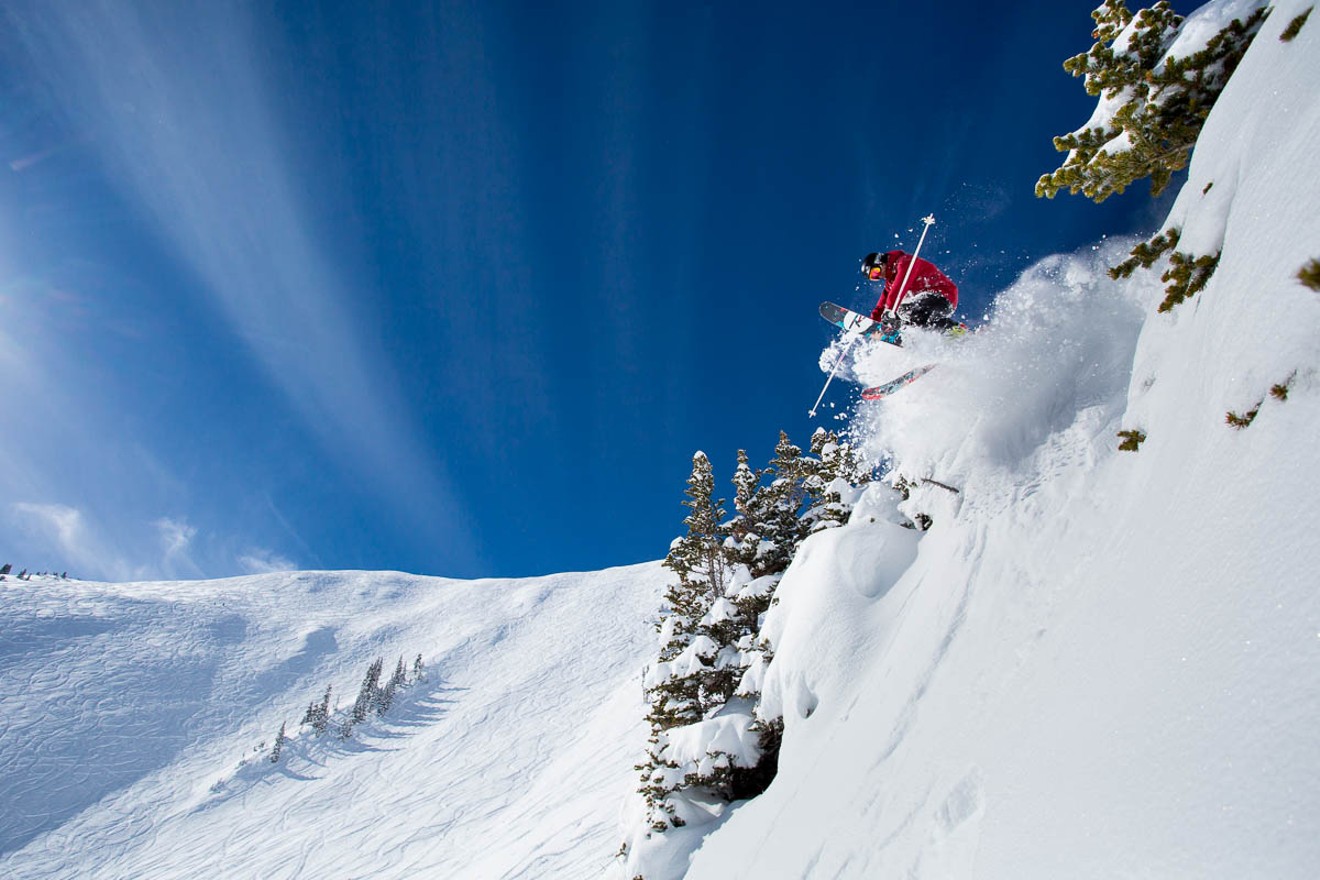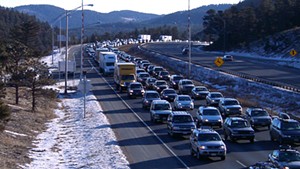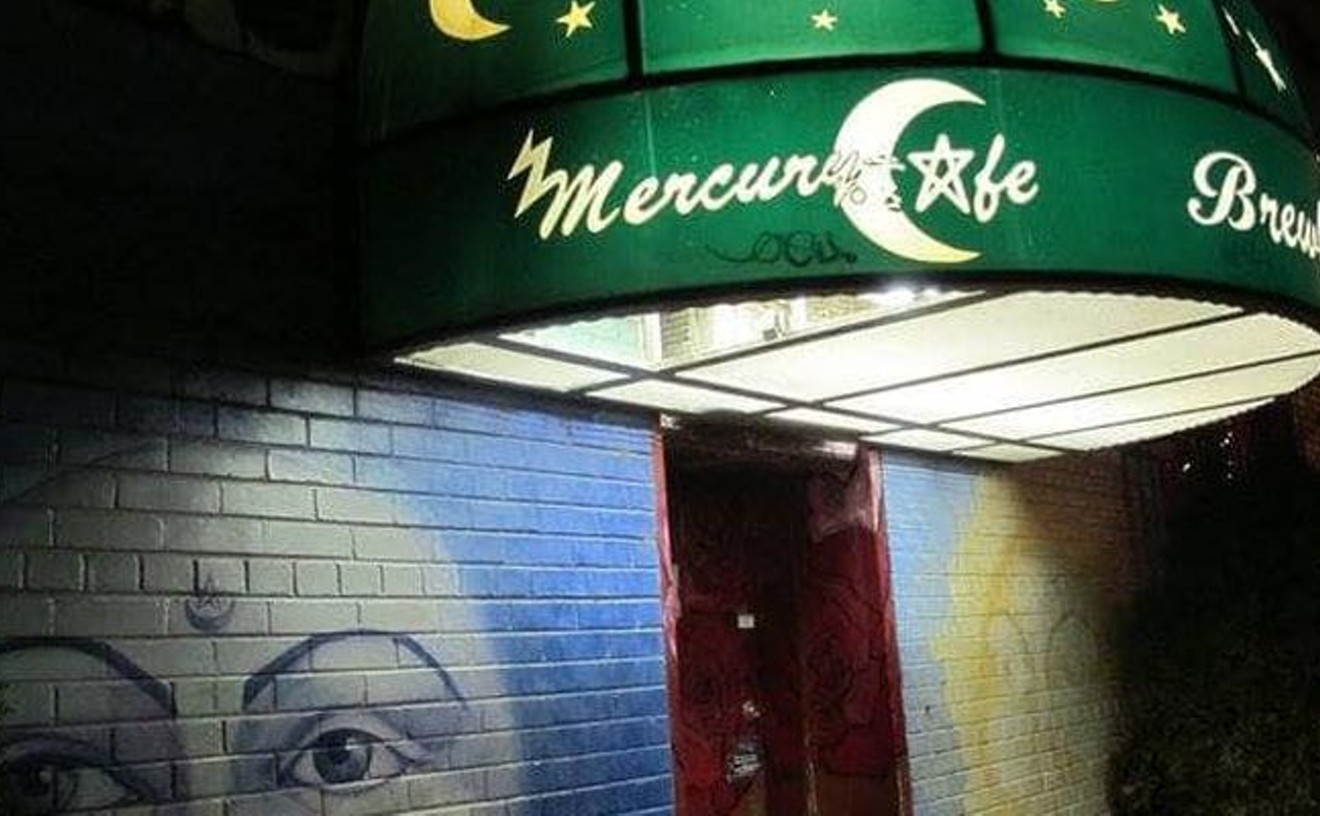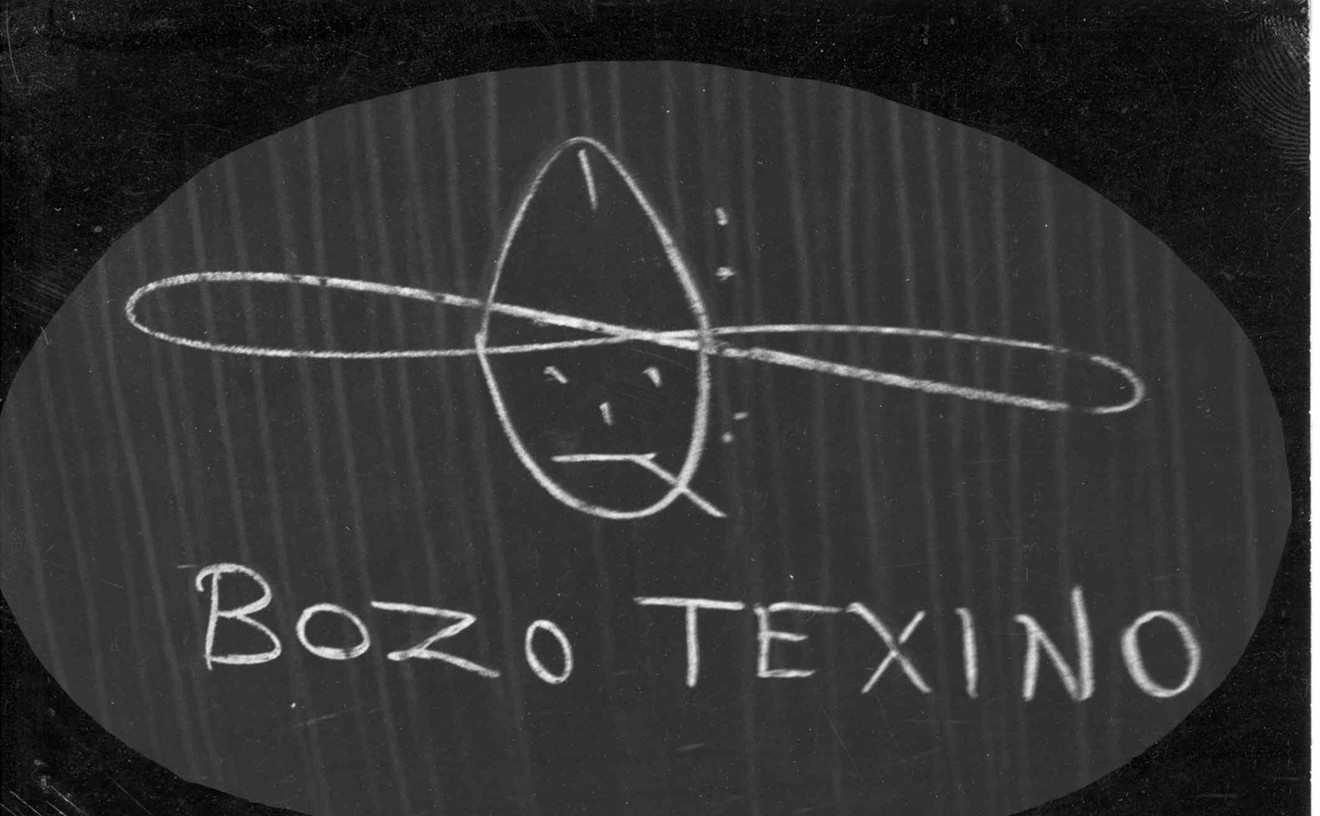Snow is falling, and the skiing should be great in the mountains. The season is off to a fast start, even if the roads aren't.
You can get there from here, but you’d better pack your patience along with some know-how when you’re navigating Interstate 70 between metro Denver and the mountain resorts. In 2008, about 11 million vehicles drove through the Eisenhower-Johnson tunnels that funnel drivers over the Continental Divide and to and from many popular ski areas; last year, the tunnels handled more than 13 million cars and trucks, an 18 percent increase from 2008. While tunnel traffic counts actually peak in the summer (yes, really), slick roads and bad drivers worsen wintertime traffic whether you’re headed “up the hill” or “down the mountain.”
Beyond staying in touch with the Colorado Department of Transportation for up-to-the-minute traffic conditions, here are ten practical ideas for easing the stress of reaching the high country:
1. Leave early from metro Denver: On Friday nights, traffic up the hill gets heavy starting about 4 p.m. On Saturday and Sunday mornings, traffic peaks between 7 and 10 a.m., because snowhounds want to arrive about the time the lifts open (usually 9 a.m.). So you’ll endure less traffic if you leave the Front Range before noon on Friday or 6:30 a.m. on weekends. In the latter case, you may arrive long before the lifts open; use the time to eat breakfast and congratulate yourself.
2. Leave the city later: Unless you’re obsessed with making first tracks, you can depart metro Denver at about 10 a.m. on weekends and still get in several hours of skiing/riding. The downside: In poor snow conditions, the runs may be rutted, slushy or “skied off” by the time you arrive.
3. Leave the slopes early: The drive down the mountain often is slower than heading up the hill, because most people exit the resorts at about the same time no matter when they arrived. To miss the bulk of returning traffic, leave before 2 p.m. on Saturday and 1 p.m. on Sunday. Downside: You’re likely to enjoy fewer ski/ride runs. So, do you want to score lots of vertical feet, or spend an extra hour sitting in traffic?
4. Leave the slopes late: Not our favorite option in bad weather, because night driving is always more dangerous even when roads are dry. (Nationally, half of all accidents happen at night, although Americans only do 25 percent of their driving after sunset, according to the National Safety Council.)
5. Stay overnight: Mountain lodging prices are higher than the elevation during peak season, but you can sometimes snag deals online, even at the last minute. If you’re really hard-core and have extra-warm gear, you can try winter camping. Just remember that as nighttime temperatures plunge, your friends will kvetch about you being a cheapskate.
6. Ski on weekdays: We can’t tell you to call into work sick when all you really want is a “powder day.” But I-70 is downright civilized from Monday afternoon through Friday morning, both east- and westbound. It’s almost like being in Colorado back in the 1980s.
7. Use the toll lanes. The eastbound express lane runs from the Empire exit to the Veterans Memorial Tunnel just downhill of Idaho Springs, and the CDOT is working to create a similar lane for westbound traffic. The tolls vary, but they’re worth it if you’re in a hurry. Please, just get in the fast lane and stop tailgating the rest of us.
8. Cut short your I-70 drive: You can jump off the interstate and take U.S. 40 to either (or both) Winter Park/Mary Jane (about 65 miles from central Denver) or to Steamboat Springs (100 miles farther, over Rabbit Ears Pass). But this is no beach cruise; in bad weather both Berthoud and Rabbit Ears passes get slicker than a politician’s promise.
9. Let someone else drive: Several shuttles service the slopes, as do some limo, Lyft and Uber drivers. Early-season rates start at $64 per person but rise in peak periods; gor families and working stiffs, shuttles and limos are too pricey for weekly use, but they’re good options when your in-laws visit and you don’t want them criticizing how you drive. Or take a bus: On weekends starting December 14, Snowstang bus service will provide direct access from Denver’s Union Station and RTD’s Federal Station in Lakewood to Loveland, Arapahoe Basin and Steamboat Resort. Roundtrip fares for Loveland and Arapahoe Basin will be $25 for adults and Steamboat will be $40. Meanwhile, CDOT's Bustang serves mountain towns near several Colorado ski areas, including Arapahoe Basin, Copper Mountain, Echo Mountain, Monarch Mountain, Purgatory Resort, Sunlight Mountain Resort and Telluride Ski Resort.
10. If your schedule doesn’t let you do any of these things, then pack lots of patience: Nationwide, tailgating causes 23 percent of all vehicle crashes, including 2,000 deaths and 950,000 injuries every year, according to the National Highway Traffic Safety Administration. And don’t even think about weaving from one lane to the next: Every lane change triples the likelihood of an accident. What’s more, the “other lane” really doesn’t move faster; that’s an optical illusion, science reveals. If you show basic courtesy to your fellow snow-sports fans, you may reach the slopes a bit later, but much more relaxed...and accident-free.
Six More Ways to Beat the Traffic
Or, you can stop whining about Interstate 70 traffic and look at a bigger state map: Of Colorado’s 26 ski/snowboard resorts (28, if you count small fry like Hesperus and Kendall Mountain), more than half can be reached from the Front Range without driving on I-70. Getting to most of them will require extra time, however, and sometimes an overnight stay — as well as some knowledge of Colorado’s highways.
1. Most residents of north metro Denver can reach the Eldora ski area in about ninety minutes by taking U.S. 36 to Colorado Highway 119, but the drive could be much longer for southern suburbanites who need to traverse the urban corridor. The journey up Boulder Canyon can also turn white-knuckle when maniacs try to pass on the twisting, two-lane Highway 119. So consider grabbing the bus at the downtown Transit Center in Boulder and letting someone else drive: Eldora is the only snow resort served by RTD.
2. Echo Mountain is just thirty miles from downtown Denver and offers really cheap lift tickets. The twisting road up Squaw Pass (yes, that’s the official name) can get icy, though. And by Colorado standards, where some ski runs drop 4,000 feet or more, Echo Mountain’s 600-foot slopes are so short that you’ll feel like you’re snow riding in the Midwest.
3. You can reach Monarch ski resort in about three hours by taking U.S. 285 southwest of the metro area. That long drive might encourage you to stay overnight in nearby towns like Salida, where — surprise! — lodging and dinner won’t cost a whole paycheck.
4. Venture farther along U.S. 285 and you’ll find that the highway intersects with roads that connect to Crested Butte, Telluride, Purgatory, Wolf Creek and the expert-only Silverton Mountain. But reaching any of those destinations requires journeys that take anywhere from four to seven hours on two-lane roads.
5. Starting in late December, the Amtrak Winter Park Express will transport passengers from Denver’s Union Station to the slopes of Winter Park Resort on Saturdays and Sundays; Fridays will be added beginning January 10. The train runs through March 29, and fares start at $29 each way for adults at Amtrak.com/WinterParkExpress.
6. And if you simply must take I-70, pull off before the tunnels and ski Loveland. With any luck, you'll be able to get in several runs and then slip into the office late without anyone noticing.
[
{
"name": "Air - MediumRectangle - Inline Content - Mobile Display Size",
"component": "12017618",
"insertPoint": "2",
"requiredCountToDisplay": "2"
},{
"name": "Editor Picks",
"component": "17242653",
"insertPoint": "4",
"requiredCountToDisplay": "1"
},{
"name": "Inline Links",
"component": "18838239",
"insertPoint": "8th",
"startingPoint": 8,
"requiredCountToDisplay": "7",
"maxInsertions": 25
},{
"name": "Air - MediumRectangle - Combo - Inline Content",
"component": "17261320",
"insertPoint": "8th",
"startingPoint": 8,
"requiredCountToDisplay": "7",
"maxInsertions": 25
},{
"name": "Inline Links",
"component": "18838239",
"insertPoint": "8th",
"startingPoint": 12,
"requiredCountToDisplay": "11",
"maxInsertions": 25
},{
"name": "Air - Leaderboard Tower - Combo - Inline Content",
"component": "17261321",
"insertPoint": "8th",
"startingPoint": 12,
"requiredCountToDisplay": "11",
"maxInsertions": 25
}
]













